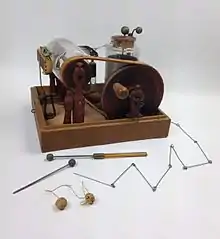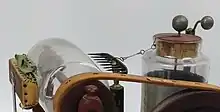Corbett's electrostatic machine
Corbett's electrostatic machine is a static electricity generating device that was made by the Shaker physician Thomas Corbett in 1810. Intended to treat rheumatism,[1] the device built up a static charge and stored it in a Leyden jar, an early type of capacitor.

Description

Corbett was a medical physician for the Shakers, a religious group of colonial America. He was a botanist and preferred herbal medicines to bloodletting.[2] His machine was hand-operated. Rotating a glass cylinder in contact with a silk pad caused a static charge to accumulate on the cylinder. A metal comb collected this charge, which was then stored in a Leyden jar. From the jar, the electrical charge could then be released into the patient, producing a shock akin to "touching a doorknob after walking across carpet in dry weather".[3]
See also
References
- Cohen, Paul S.; Cohen, Brenda H. (1998). America's Scientific Treasures: A Travel Companion. American Chemical Society. p. 98. ISBN 0841234442.
- Swank, Scott T. (1999). Shaker Life, Art, and Architecture: Hands to Work, Hearts to God. Abbeville Press. p. 82. ISBN 0789203588.
- Sharon Duane Koomler (2015). "Thomas Corbett electrostatic machine". Seeking Perfect – the Shaker's material world. Antiques and Fine Art.